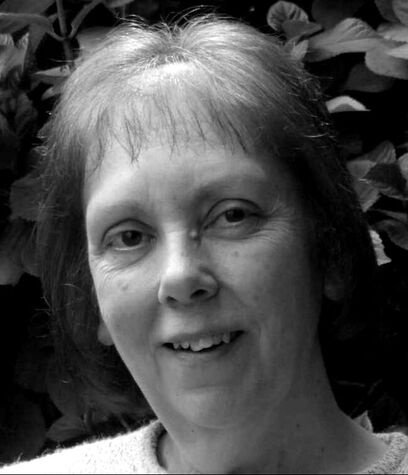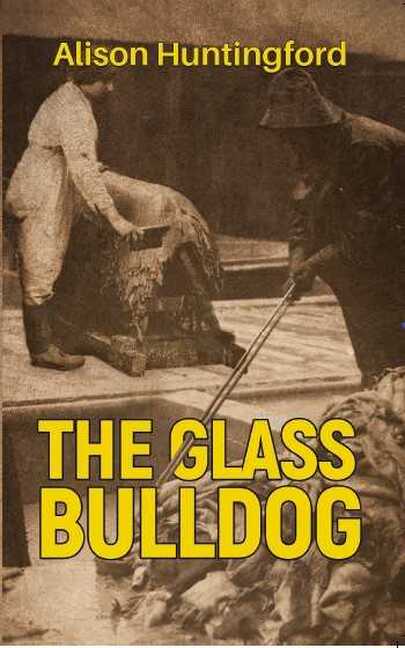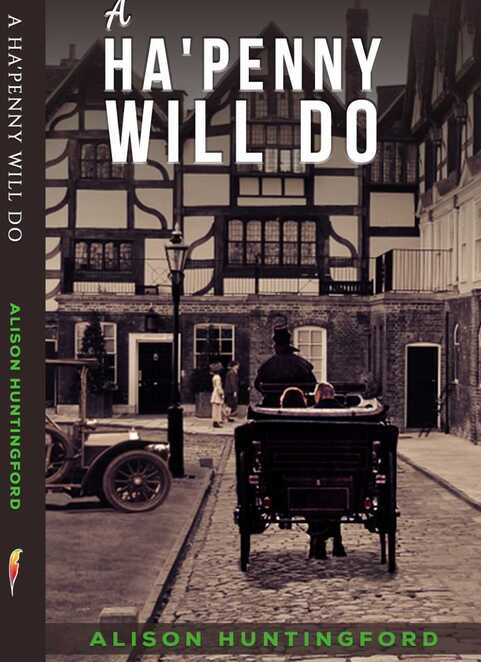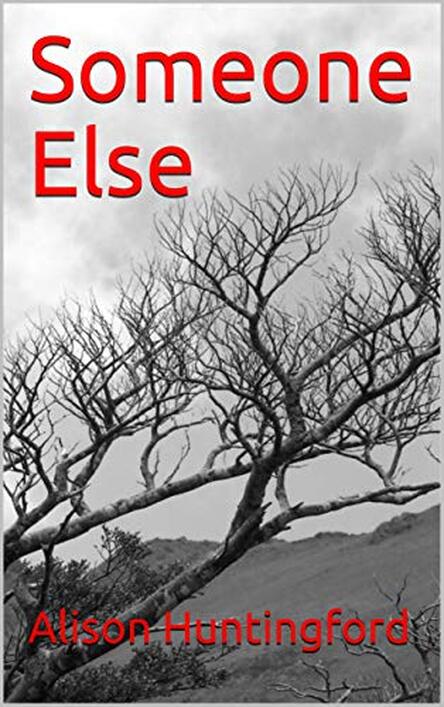
It gives me great pleasure to welcome Alison Huntingford onto the website today. Alison's novels are based on her own very carefully researched family histories.
Alex: Tell me a bit about yourself, Alison.
Alison: Being the only child of two only children, I have always felt a distinct lack of family. This led me to research my family history and what I found there fascinated me. I grew up in Devon (and currently live in Ivybridge) but was not born here, however I have always felt a strong connection to the county. Therefore when I found that actually I am descended from a very old Devonshire family, the Finnimores, I was delighted. A chance snippet of information in a parish archive about my great-great grandfather Tom Finnimore sent me off on a voyage of discovery. Arrested and imprisoned for stealing six chickens at the age of 16, he somehow survived to have a family and a second chance. The more I found out about his life the more vivid it became until I was compelled to write up Tom’s story. This became my debut novel ‘The Glass Bulldog.’ I have spent years carefully researching the facts of his life and the context of the time, and can say that I feel it represents a realistic picture of the life of the working class poor in Victorian Britain. Though it is a fictionalised account, all the main events actually happened as told, and I have tried to be as accurate as possible, especially with names, dates and places. The novel covers a period of over fifty years from 1832 to 1885. This was a challenge in itself to portray, but I felt that if I made the book any shorter it would not be doing justice to Tom.
The glass bulldog is a real object passed down through the generations from the family in this novel. It is used in the prologue and epilogue as an overseer of events, and also as a metaphor for survival.
I have a degree in Humanities with Literature and have always enjoyed reading, especially the great writers of the 19th Century, such as Charles Dickens and Thomas Hardy. A great deal of my working life has been spent teaching English and maths to young people in the workplace.
I have done many different jobs in my life, from nursing to shelf filling and everything in-between! Having lived long enough now, I realise that life very rarely goes to plan.
Alex: Tell me a bit about yourself, Alison.
Alison: Being the only child of two only children, I have always felt a distinct lack of family. This led me to research my family history and what I found there fascinated me. I grew up in Devon (and currently live in Ivybridge) but was not born here, however I have always felt a strong connection to the county. Therefore when I found that actually I am descended from a very old Devonshire family, the Finnimores, I was delighted. A chance snippet of information in a parish archive about my great-great grandfather Tom Finnimore sent me off on a voyage of discovery. Arrested and imprisoned for stealing six chickens at the age of 16, he somehow survived to have a family and a second chance. The more I found out about his life the more vivid it became until I was compelled to write up Tom’s story. This became my debut novel ‘The Glass Bulldog.’ I have spent years carefully researching the facts of his life and the context of the time, and can say that I feel it represents a realistic picture of the life of the working class poor in Victorian Britain. Though it is a fictionalised account, all the main events actually happened as told, and I have tried to be as accurate as possible, especially with names, dates and places. The novel covers a period of over fifty years from 1832 to 1885. This was a challenge in itself to portray, but I felt that if I made the book any shorter it would not be doing justice to Tom.
The glass bulldog is a real object passed down through the generations from the family in this novel. It is used in the prologue and epilogue as an overseer of events, and also as a metaphor for survival.
I have a degree in Humanities with Literature and have always enjoyed reading, especially the great writers of the 19th Century, such as Charles Dickens and Thomas Hardy. A great deal of my working life has been spent teaching English and maths to young people in the workplace.
I have done many different jobs in my life, from nursing to shelf filling and everything in-between! Having lived long enough now, I realise that life very rarely goes to plan.

Alex: How would you describe your writing, and are there particular themes that you like to explore?
Alison: My writing takes place anywhere and everywhere, even whilst sitting in the car. I find driving is a great way to free the mind and inspire the imagination, and I've often had to pull over in order to get stuff down on paper. I always write the first draft by hand, as I think better that way, then redraft and amend it as I type it up. My main themes are the difficulties of real life and in coping with what life throws at you.
Alex: Are you a writer that plans a detailed synopsis or do you set out with a vague idea and let the story unfold as you write?
Alison: As my novels are based on true life histories I already have a rough plan to follow. I do plot out things as I go along but I know where I am going with it. My plans are usually just rough notes.
Alex: Tell us about your latest novel.
Alison: My new novel is due out shortly and is called A Ha’penny Will Do. Book description below:
Based on a true story
Three members of one family are linked by their struggle to survive poverty and war at the turn of the century.
Kate – lonely Irish immigrant, homesick and with dreams of being a writer. After difficult times in Liverpool she comes to London hoping for a better life. Hoping to escape from a life of domestic service into marriage and motherhood, she meets charming rogue William Duffield. Despite her worries about his uncertain temperament, she becomes involved with him. Will it be an escape or a prison?
Fred – restless elder son, devoted to his mother yet locked in a tempestuous relationship with his father. War intervenes and he secretly signs up to serve abroad. Is his bad reputation deserved? What will become of him?
Joe – too young to sign up for WW1, left to endure the hardships of war on the home front and deal with his own guilt at not being able to serve. He starts an innocent friendship with his sister in law which sustains him through hard times. Will he survive the bombs, the riots, the rationing and find true love in the end?
These are their intertwined and interlocking stories told through the medium of diaries, letters and personal recollections. Based on the author’s family history and covering the period of 1879 – 1920, the truth is never plain and rarely simple.
This novel is a fresh and compelling look at life for the working class poor in England at the end of the Victorian era. Covering issues such as the struggle for home rule in Ireland, the hardships of domestic service, marital strife, the suffragettes and the horrors of World War 1 on the home front and abroad, this is a realistic and gripping tale which keeps the reader involved in their human plight all the way.
Alison: My writing takes place anywhere and everywhere, even whilst sitting in the car. I find driving is a great way to free the mind and inspire the imagination, and I've often had to pull over in order to get stuff down on paper. I always write the first draft by hand, as I think better that way, then redraft and amend it as I type it up. My main themes are the difficulties of real life and in coping with what life throws at you.
Alex: Are you a writer that plans a detailed synopsis or do you set out with a vague idea and let the story unfold as you write?
Alison: As my novels are based on true life histories I already have a rough plan to follow. I do plot out things as I go along but I know where I am going with it. My plans are usually just rough notes.
Alex: Tell us about your latest novel.
Alison: My new novel is due out shortly and is called A Ha’penny Will Do. Book description below:
Based on a true story
Three members of one family are linked by their struggle to survive poverty and war at the turn of the century.
Kate – lonely Irish immigrant, homesick and with dreams of being a writer. After difficult times in Liverpool she comes to London hoping for a better life. Hoping to escape from a life of domestic service into marriage and motherhood, she meets charming rogue William Duffield. Despite her worries about his uncertain temperament, she becomes involved with him. Will it be an escape or a prison?
Fred – restless elder son, devoted to his mother yet locked in a tempestuous relationship with his father. War intervenes and he secretly signs up to serve abroad. Is his bad reputation deserved? What will become of him?
Joe – too young to sign up for WW1, left to endure the hardships of war on the home front and deal with his own guilt at not being able to serve. He starts an innocent friendship with his sister in law which sustains him through hard times. Will he survive the bombs, the riots, the rationing and find true love in the end?
These are their intertwined and interlocking stories told through the medium of diaries, letters and personal recollections. Based on the author’s family history and covering the period of 1879 – 1920, the truth is never plain and rarely simple.
This novel is a fresh and compelling look at life for the working class poor in England at the end of the Victorian era. Covering issues such as the struggle for home rule in Ireland, the hardships of domestic service, marital strife, the suffragettes and the horrors of World War 1 on the home front and abroad, this is a realistic and gripping tale which keeps the reader involved in their human plight all the way.

Alex: What was the first book you read?
Alison: I can’t remember exactly but I know I read loads of Enid Blyton stories as a child, and I still think they are great, now. Political correctness has made her go out of fashion but they are really good stories.
Alex: How much research do you do and what does it usually entail?
Alison: Because my books are based on true family history I do a lot of research on genealogy sites, as well as the internet generally to get the specific details of the period. I also use books such as The Readers Digest ‘Portrait of an Era’ which has been a wonderful source of information for the first half of the 20th century. I am very keen to get the historical details as authentic as possible.
Alex: Do you ever base your characters on people you have encountered in real life?
Alison: Absolutely! Though they are well disguised, I hope. All writers take things from their own experiences.
Alex: Which was the last book you read that blew you away?
Alison: Lord of the Rings, which I have read countless times since I was a teenager, but it never fails to blow me away every time.
Alex: How do you market your books?
Alison: They are available from my publisher Austin Macauley plus Amazon and the usual online outlets. However I also spend a great deal of time trying to promote them on Facebook, Twitter and Instagram. I also run the South Hams Authors Network, which supports and encourages other local authors. We work together to make opportunities happen for all of us such as reading sessions at libraries and other events.
Alison: I can’t remember exactly but I know I read loads of Enid Blyton stories as a child, and I still think they are great, now. Political correctness has made her go out of fashion but they are really good stories.
Alex: How much research do you do and what does it usually entail?
Alison: Because my books are based on true family history I do a lot of research on genealogy sites, as well as the internet generally to get the specific details of the period. I also use books such as The Readers Digest ‘Portrait of an Era’ which has been a wonderful source of information for the first half of the 20th century. I am very keen to get the historical details as authentic as possible.
Alex: Do you ever base your characters on people you have encountered in real life?
Alison: Absolutely! Though they are well disguised, I hope. All writers take things from their own experiences.
Alex: Which was the last book you read that blew you away?
Alison: Lord of the Rings, which I have read countless times since I was a teenager, but it never fails to blow me away every time.
Alex: How do you market your books?
Alison: They are available from my publisher Austin Macauley plus Amazon and the usual online outlets. However I also spend a great deal of time trying to promote them on Facebook, Twitter and Instagram. I also run the South Hams Authors Network, which supports and encourages other local authors. We work together to make opportunities happen for all of us such as reading sessions at libraries and other events.

Alex: What are your interests aside from writing? And what do you do to unwind?
Alison: In my spare time, when I’m not writing, I enjoy spending time with my husband, our five cats and elderly rabbit, listening to folk and world music, going to the cinema and trying to grow vegetables, with limited success!
Alex: Which authors do you particularly admire and why?
Alison: Charles Dickens and Thomas Hardy because they had such an understanding and compassion for the poverty stricken people of their time. Also, they are great stories with memorable characters.
Alex: Thank you so much for sharing your writing life with us, Alison and best of luck with your latest book.
Alison: Thank you Alex.
Alison: In my spare time, when I’m not writing, I enjoy spending time with my husband, our five cats and elderly rabbit, listening to folk and world music, going to the cinema and trying to grow vegetables, with limited success!
Alex: Which authors do you particularly admire and why?
Alison: Charles Dickens and Thomas Hardy because they had such an understanding and compassion for the poverty stricken people of their time. Also, they are great stories with memorable characters.
Alex: Thank you so much for sharing your writing life with us, Alison and best of luck with your latest book.
Alison: Thank you Alex.
